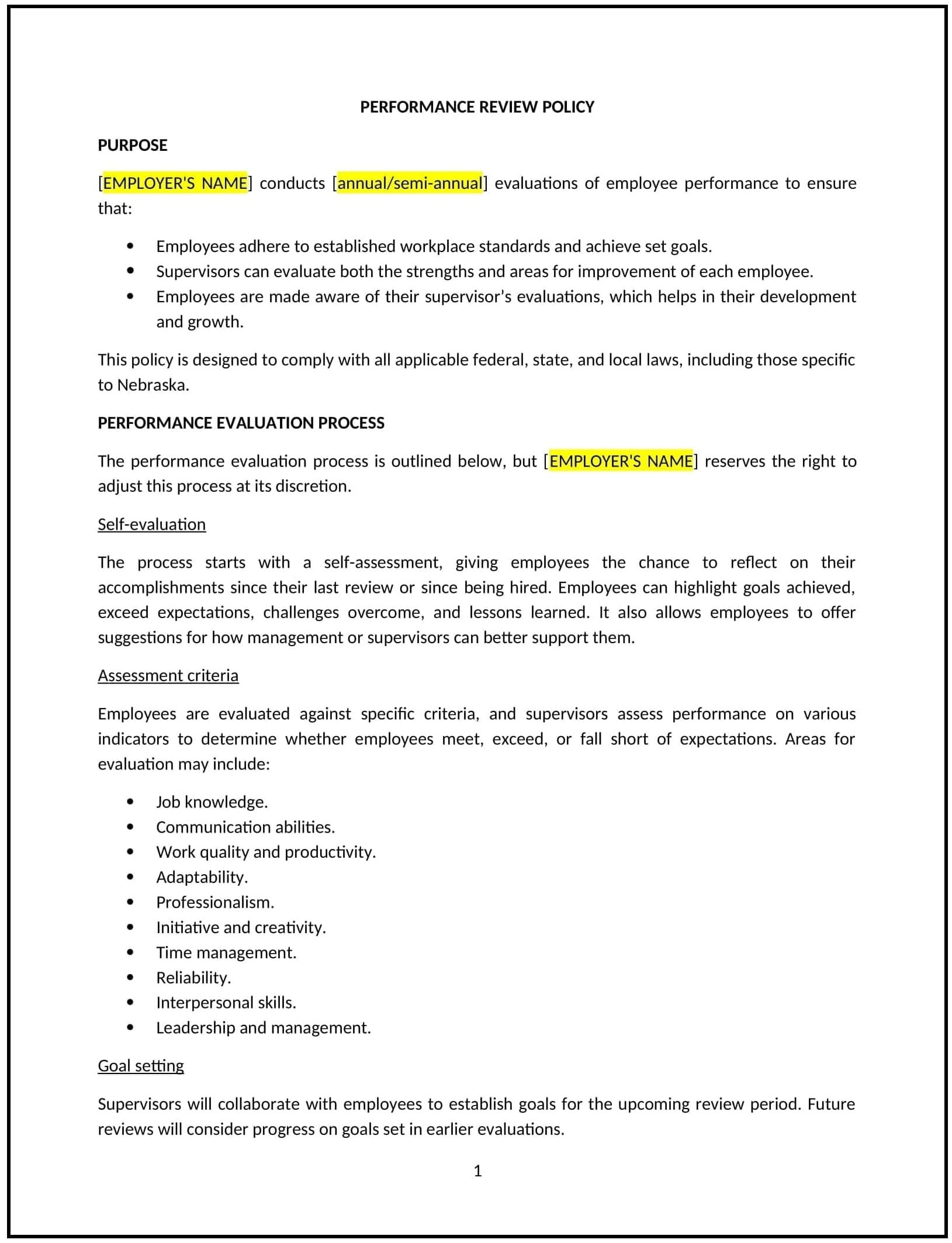Performance review policy (Nebraska): Free template
Got contracts to review? While you're here for policies, let Cobrief make contract review effortless—start your free review now.

Customize this template for free
Performance review policy (Nebraska)
A performance review policy helps Nebraska businesses establish a structured process for evaluating employee performance, providing feedback, and setting goals. This policy is designed to promote transparency, fairness, and continuous improvement in the workplace. By formalizing performance review practices, businesses can support employee development, align individual goals with organizational objectives, and foster a culture of accountability.
By implementing this policy, businesses in Nebraska can enhance employee engagement, improve productivity, and demonstrate a commitment to professional growth.
How to use this performance review policy (Nebraska)
- Define review frequency: Specify how often performance reviews will be conducted, such as quarterly, semi-annually, or annually.
- Establish evaluation criteria: Outline the key performance indicators (KPIs) and competencies used to assess employee performance.
- Set review process: Describe the steps involved in the review process, including self-assessments, manager evaluations, and feedback sessions.
- Provide feedback guidelines: Offer guidance on how to deliver constructive feedback that is specific, actionable, and supportive.
- Include goal-setting: Encourage employees and managers to set SMART (Specific, Measurable, Achievable, Relevant, Time-bound) goals during reviews.
- Address documentation: Explain how performance reviews will be documented and stored, ensuring confidentiality and accessibility.
- Communicate the policy: Share the policy with employees during onboarding and through internal communications to ensure awareness and understanding.
- Train managers: Educate supervisors on how to conduct fair and effective performance reviews, including bias prevention and feedback techniques.
- Review and update the policy: Periodically assess the policy’s effectiveness and make adjustments as needed to reflect changes in business needs or employee feedback.
Benefits of using this performance review policy (Nebraska)
This policy offers several advantages for Nebraska businesses:
- Promotes transparency: Clear guidelines help employees understand how their performance is evaluated and what is expected of them.
- Supports employee development: Regular feedback and goal-setting encourage professional growth and skill improvement.
- Enhances productivity: Performance reviews help identify strengths and areas for improvement, leading to more effective work practices.
- Aligns with Nebraska values: The policy reflects the state’s emphasis on fairness, accountability, and community support.
- Improves communication: Structured reviews foster open dialogue between employees and managers, strengthening workplace relationships.
- Encourages accountability: Clear expectations and regular evaluations help employees take ownership of their performance.
- Supports decision-making: Performance data can inform decisions related to promotions, training, and resource allocation.
Tips for using this performance review policy (Nebraska)
- Communicate the policy effectively: Share the policy with employees during onboarding and through regular reminders, such as emails or training sessions.
- Provide training: Educate managers on how to conduct fair and effective performance reviews, including bias prevention and feedback techniques.
- Use consistent criteria: Ensure all employees are evaluated using the same KPIs and competencies to maintain fairness.
- Encourage two-way feedback: Allow employees to share their perspectives and concerns during review sessions.
- Document reviews: Maintain detailed records of performance reviews to track progress and support decision-making.
- Address concerns promptly: Create a process for employees to raise questions or concerns about their reviews and resolve them fairly.
- Review the policy periodically: Update the policy as needed to reflect changes in business needs, employee feedback, or industry standards.